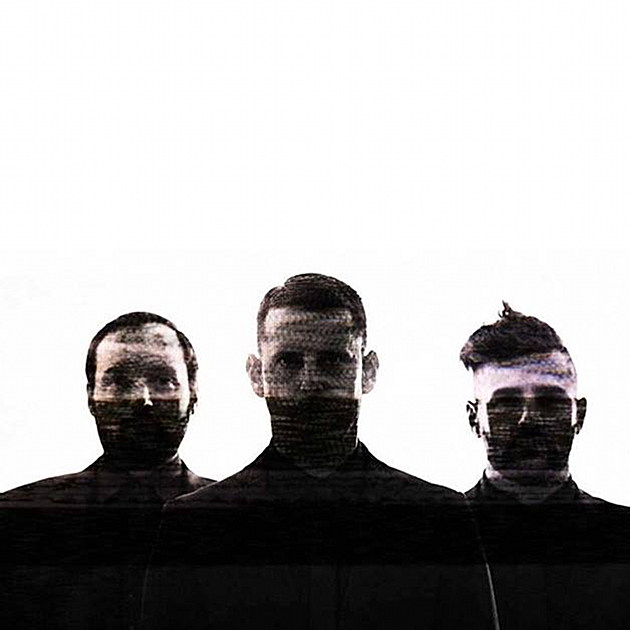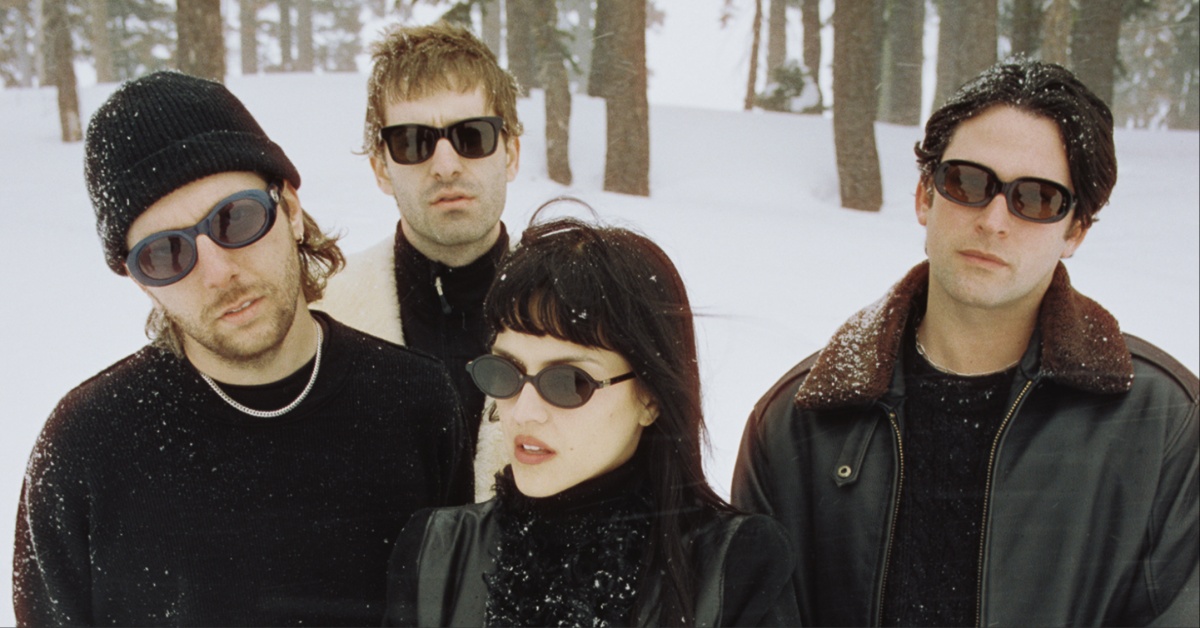
Interview: A.J. Annunziata (Sannhet)
. . .
Although not as divisive as Liturgy’s The Ark Work, Sannhet’s sophomore album Revisionist is definitely one of the foremost “mixed review” metal releases of 2015. A great deal of people love Sannhet, yet just as many people passionately deplore them. The positive feedback celebrates Sannhet’s approach to metal, which incorporates cavernous post-rock, black metal burst beats, and intrepid melodies – all via prodigious musicianship. The negativity, however, stems mainly from dismay: myriad unorthodox metal bands (like Sannhet) are endowed plenty accolades by critics, yet they often aren’t revered by/reflective of the tastes of the metal community.
It’s an opaque, complex predicament, and Sannhet have been caught in the middle of it since Revisionist dropped back in March. Bassist A.J. Annunziata shed light on Sannhet’s mixed reception. He also dissected the pertinence of crossing over genres (the trio recently opened up for young indie post-punk mavericks Viet Cong in Brooklyn) and how the trio are just a bunch of weirdos:
. . .
. . .
Sannhet opening up for Viet Cong sounds like a peculiar show bill. How’d that come about?
All of our shows lately are peculiar. We actually just played with Jane’s Addiction as well. I dig it. I’m kind of stoked that you can be seen as not metal, so I embrace that. The day or two after the record dropped, we started getting all these calls from different booking agents and we were just trying to figure out who we could work with. We told everybody we wanted to do different stuff, so that was one of the ones that got thrown at us. Like I said, we like weird crossover things. The music’s hard, but we don’t really see it as so much as metal. We embrace the crossover as much as possible. But it was fun!
Do you notice if the crossover has resulted in a more diversified audience/fanbase?
You know, I feel like we’d still have the same fans even if we were just playing metal shows. I don’t know. People who are really really into metal don’t like us because we’re just too soft, people who like indie rock don’t like us because we’re too hard. But there’s a bunch of weirdos in the middle that like more eccentric stuff. I feel like they would’ve sought us out either way. It’s just kind of fun to play to different crowds.
It was interesting the other day that Spotify released the [statistics] of what people were listening to, and metal was one of the top genres over pop, which was really interesting. That means that there’s a sea change and people are, because of the mass expansion of information available – you know, of all these kinds of media – people are able to mix and match the things they’re into. Like in the ‘70’s, [definitive questions were] “What radio station do you listen to?” or “What music do you listen to?” or “What do you identify as?” Your entire personality was wrapped around the very specific music you listened to – I don’t wanna say “genre” because those probably weren’t as visible. Now you’re able to go out and get whatever you want, make your own playlist, make really eclectic things. You don’t have to buy your own media, you don’t have to commit to anything really.
It fosters this idea where you could be eclectic, you could be into a lot of different things, or you could dabble in a bunch of different things. You don’t have to be a metalhead or a mod kid. There’s no commitment there anymore. You’re not defined by that. I think that’s why we’re getting more of all these crossover bands that bend all these genres, because there’s just not the same rules anymore. This generation, I think, cares a lot less about that identity, which is cool.
Do you often use Spotify or other streaming services to find new music?
I haven’t really gone and discovered new music on Spotify, [it’s] not really conducive of that. [With] Soundcloud, you just get lost in a wormhole of stuff. Mostly I find myself listening to more hip-hop on Soundcloud – a lot of good electronic and hip-hop stuff on there, there’s a lot of people contributing. Those kids are very prolific because it’s easy to make [that music]. It’s usually one person making the production, a lot less people involved.
Music like our band’s, it’s very laborious and difficult to get three people on the same page about an idea. You put together the thing, then arrange the song, then everybody get’s okay with it, then you tweak it a little bit, then you gotta go record it. Then the way you record, using different mics and amps. Everything is tweaking, tweaking, and tweaking. Then you go and mix it, and then you have to go to a mastering person, and then you have to release it. Getting music out is a lot harder to do when you’re a full band. The [process] there is slower than I think you would have with anything electronic based.
So I guess what I’m trying to say is I listen to bands with real instruments on Spotify [laughs], because I usually know what I’m looking for when I go into it. And then I deal with my dark electronic wormholes on Soundcloud. I use Tidal now a little bit. Not Rdio, Rhapsody, or Pandora.
I used Google Translate and saw that “Sannhet” means “truth” in Norwegian. Do any of you guys speak the language or did you just Google Translate to find it?
So it means “truth,” but it also loosely means “reality.” Yes it means “truth,” yes it’s a Norwegian word, and yes we play black metal for a little bit, but we use it more because – if you look at the logo, what we’re trying to say is that there’s mini-truths. There are photos of three different prime shapes, and then a little logo. Each one of those is supposed to represent us, but they all have prime heart shapes. They all lead in different directions.
We knew that word going into it. We weren’t just like, “Oh let’s find a cool Norwegian word!” It’s not just Norwegian, it’s most Nordic languages – so not just Norway, but also Finland, Iceland, and all those viking countries. There’s similarities to that word in other European languages as well. That’s kind of a roundabout explanation there. We didn’t use Google Translate, we knew the word. We weren’t just fucking around [thinking], ”Oh let me look up a word in Norwegian and see if it looks cool!”
Everything we do is insanely methodical, thought-out, considered, and painstakingly argued over. It’s not just an affectation, if that’s what you may have been suggesting.
No no no, not at all. Are you into “True” Norwegian black metal bands?
Me personally, not so much. I mean I definitely listened to a lot of it when it was happening, but I don’t geek out on it. I cannot be committed to a specific genre. I also listen to a lot of different things. I get into little things, I dabble here and there. I don’t try to stay committed or overly involved with any specific genre, because so much is accessible. I think anyone who gets really deep into specific genres, especially sub-genres within metal, they become kind of dark and elitist, and I don’t really dig that.
I published a Spotify playlist that [we’ve] come to listen to as a band, and it’s really all over the place. I don’t think there’s actually any black metal stuff on there. We’re not completely inspired by that stuff, we really take inspiration from everywhere. My favorite types of guitar-sounding bands are post-punky bands, things that kind of teeter on the edge of dark popular music. So I’m a big Sisters Of Mercy fan, Joy Division of course, Bauhaus, and bands like that. And then also dark electronic stuff.
How did your expectations of how popular Revisionist would be differ from those you had for Known Flood?
Known Flood… We kind of actually thought it was gonna do better than it did when it hit, but we were actually super ecstatic for it to even get any attention at the time because we were such a young, green band. We knew we liked the music, we knew we put on a cool show, but we weren’t positive that other people would vibe with it. We’re happy with what it did. We just didn’t expect anyone to care about Revisionist, because it was weird. It was weird to us when we listened to it, it was hard to define even for us. When it did kind of catch wind, we were super ecstatic, but also a little surprised that it did make any wake. Very influential people were into it, they definitely helped for wind in those sails.
We’re just always surprised when anyone latches onto something we make. When we’re making our music, it’s such a tumultuous, aggravating, involved, emotional output to get to birth these songs. They’re insanely personal to us. You think to yourself, Why would anyone care about this band that I care so much about?, because it really is meant to please us. We’re like, “Nobody’s gonna get this, nobody’s gonna like this, it’s too weird, we’re weird people, nobody’s gonna like us.” It’s nice when there’s some positive reinforcement and reaction to something you made. There’s a little of all of us just like, “When are people gonna figure out that we’re weirdos?” [laughs]. Kind of like we feel like we’re getting away with something.
. . .
Sannhet are playing the following West Coast tour dates with King Woman and Planning for Burial.
June 27 Portland, OR @ Holocene
June 28 Seattle, WA @ Barboza
June 30 San Francisco, CA @ The Chapel
July 1 Santa Ana, CA @ Constellation at Observatory
July 2 San Diego, CA @ Soda Bar
July 3 Los Angeles, CA @ The Echo
. . .












